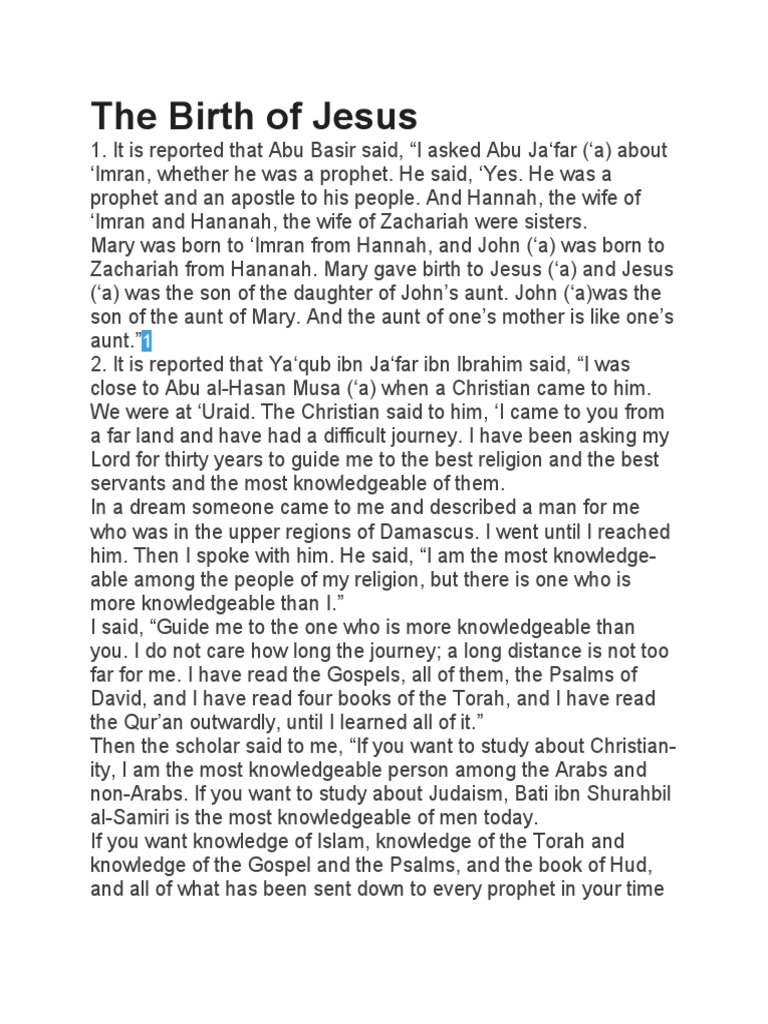The narrative surrounding the Birth of Jesus is one that resonates deeply with countless believers across various faith traditions. In the Bahá’í Faith, this event is not merely a historical occurrence, but a profound emblem of divine intervention and spiritual renewal. The Bahá’í perspective invites individuals to explore the teachings of Jesus Christ through a lens that emphasizes unity, the progressive revelation of God, and the transformative implications of his life and ministry.
The predominant emphasis in Bahá’í theology is the concept of the “Oneness of Humanity.” This principle asserts that all major religions, including that of Jesus, represent different facets of a singular divine truth. The Birth of Jesus can be viewed as a pivotal moment within the continuum of religious evolution. By acknowledging the significance of this event, Bahá’ís recognize Jesus not only as a central figure in Christianity but also as a manifestation of God who has vital relevance for humankind’s spiritual development.
In many traditions, the story of Jesus’ birth is steeped in miraculous elements—the virgin birth, the visits from angels, and the guidance of celestial bodies are often recounted with reverence. The Bahá’í perspective, however, transcends the miraculous to explore the implications of Jesus’ birth on spiritual consciousness. The teachings illuminate the transformative power of this event, serving as a catalyst for personal and societal change. Bahá’ís believe that Jesus, like all prophets, was endowed with divine attributes and came to bring enlightenment needed for humanity’s progression.
At its core, the Bahá’í interpretation of the Birth of Jesus stresses the importance of understanding His teachings as a call to moral and spiritual awakening. The beauty of this narrative rests in its potential to inspire introspection and action. When individuals reflect on Jesus’ life, they are beckoned to embrace virtues such as love, compassion, and justice. These virtues resonate as essential qualities for any person seeking to foster harmony within their communities. The life of Jesus exemplifies an unwavering commitment to humanity and moral rectitude, qualities that the Bahá’í Faith ardently upholds.
Moreover, the Bahá’í writings elucidate that Jesus’ birth heralded a new epoch of spiritual guidance. Bahá’ís assert that spiritual teachings are not static, but rather dynamic revelations that evolve in accordance with humanity’s growth. Jesus’ advent was a significant milestone in this ongoing revelation by serving to awaken the human spirit and initiating a paradigm shift in moral and ethical standards. This acknowledgment of progressive revelation invites followers to approach the life of Jesus with curiosity, understanding that His teachings continue to unfold within contemporary contexts.
The eschatological implications of Jesus’ birth are also noteworthy in the Bahá’í framework. In Bahá’í thought, Jesus’ role transcends that of a mere prophet; He is perceived as the harbinger of a more profound divine purpose. His message is both a promise and a prelude to the eventual emergence of a unified world civilization—a core tenet of Bahá’í belief. Within this lens, the Birth of Jesus resonates as both a historical event and an enduring promise of a world nurtured by justice and peace.
Emphasizing the interconnectedness of all religious manifestations, the Bahá’í Faith posits that the birth of Christ is not an isolated event, but rather part of a grand tapestry of divine purpose. This theological insight encourages followers to engage with the teachings of Jesus not only in their historical context but also in their applicative potential for creating a more just society today. By embracing the concepts of unity and global consciousness espoused by Bahá’í teachings, individuals are positioned to actualize the transformative power of the principles taught by Jesus Christ.
Furthermore, the Bahá’í interpretation encourages an inquiry into the spiritual significance of Jesus’ life beyond liturgical observances. Instead of being confined to ecclesiastical routine, the teachings of Jesus challenge believers to manifest His principles in their daily lives. The Birth of Jesus, therefore, is not just a moment commemorated in history; it becomes a rallying point for ethical living, social justice, and the continual pursuit of truth. In this way, believers are inspired to live lives that exemplify the virtues espoused by Christ, thus fulfilling His mission to uplift humanity.
In embracing the Bahá’í perspective on the Birth of Jesus, one is invited to traverse realms of spiritual inquiry that expand the understanding of divinity and prophethood. The call to view Jesus as a key figure within a broader religious narrative inspires believers to seek unity rather than division, understanding rather than dogmatism, and love rather than animosity. It promises a shift in perspective that challenges entrenched views and compels adherents to examine their beliefs in light of human fellowship and cooperation.
In conclusion, the Birth of Jesus is rightly celebrated within the Bahá’í Faith as a significant milestone that evokes curiosity, introspection, and a call to action. The teachings regarding His birth extend beyond the superficial, offering deep spiritual insights and practical applications. As individuals reflect upon the life of Jesus, they are challenged to embrace the virtues He represented—a challenge that is as significant today as it was over two millennia ago. By doing so, they contribute to the collective advancement of humanity on a path towards unity and peace, a cornerstone of Bahá’í belief.
